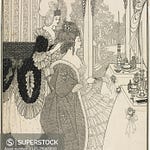Our Poem of the Week is an excerpt from Canto 31 of the Divine Comedy, my own translation. The pilgrim Dante is on the top of the mountain of Purgatory, and he has just been immersed in the River Lethe, which washes his sins from his memory, not, I think, that he doesn’t recall having committed them, but that they are no longer felt as a part of him. It’s as if they’re as far away as earth from heaven. And he longs to see the face of his beloved Beatrice. He has seen her, but she had rebuked him and had caused him to weep for what he had done, so now he will see her for the first time since his purification. So the three dancing ladies, Faith, Hope, and Charity, taking their turn after the four ladies who represented the four cardinal virtues, lead Dante to Beatrice, and they call upon her to look at him — to turn her eyes to him, and to unveil to him the beauty that fills her eyes with light beyond their light. That is, they are asking her to smile upon him in love. It will be her first smile in the Divine Comedy, the first of many.
Sometimes the things we see most often in life are the most mysterious, but it takes a great poet to make us consider them in truth, to find in them a source of wonder. One of them is the human face. Oh, I’m quite aware that all the mammals have faces, and birds and fish too. I am looking at the face of our terrier puppy Molly, who looks at me with her jet-black pupils, like two little onyx marbles, and I know that she wants to see my face; why, our old dog Jasper of happy memory, he of the 80 tricks, would “look me in the eye” on command, planting his paws on my chest and gazing into my face, waiting for the next motion or word of affection or command. Yes, I do know that animals have faces, and they need them, too, to see in front of them, and to make some signals to their fellows. And yet the human face is more — expressive of a mind, a person, whose thoughts are not bound by what appears before his eyes, and whose love can soar beyond the stars.
“The human face divine,” that’s what Milton called it after he had gone blind, and he longed to look upon it again. That’s exactly right: the noun between the two adjectives, with the more important one as the climax: divine. There’s no doubt in my mind that Dante would have understood the insight. Imagine to have been blind from birth, and to see a human face for the first time. More: imagine that you don’t see his face until he turns: what a stupendous moment it must be! For one of the characteristics of having a face is that you do turn to look upon someone you love. And then, with the smile, it is like the sun rising over the horizon. That is Dante’s experience here. It is so powerful, that there is no more to say — the canto ends just here, with the poet’s expression of speechlessness. Yet he could not have expressed himself more fully if he had taken a thousand words to do it. We too see the blessed woman’s face, though Dante has not described a single feature. Brilliant — and deeply human.
While full of wonderment my happy soul tasted the food that whets the appetite with the first taste that satisfies in full, Showing themselves by action to belong to a higher tribe, the other three came forth, dancing in measure to their angel song. "Turn, Beatrice, turn your holy eyes," so did they sing, "unto your faithful one, he who has come so far to look on you! Do us the grace for grace's sake, unveil your lips to him, that he may finally behold the second beauty you conceal." Eternal radiance of living light! Who ever sipped of the Castalian spring or paled upon Parnassus' wooded height, Would not now find his mind a burdened thing, attempting to portray you as you seemed, where Heaven had shaded you in harmony And freely in the air your beauty gleamed?
Listen to this episode with a 7-day free trial
Subscribe to Word & Song by Anthony Esolen to listen to this post and get 7 days of free access to the full post archives.













